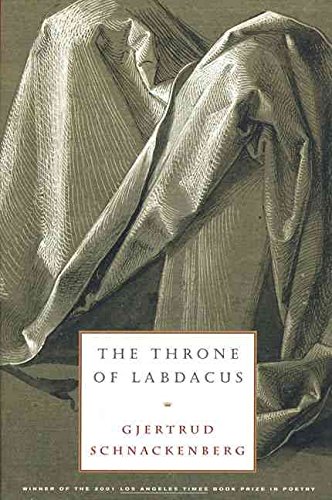What do you think?
Rate this book


Paperback
First published January 1, 2000
It is the immediate that escapes not only men but the gods too: "The immediate, strictly speaking, is as impossible for the gods as it is for men." Hölderlin is referring here to the lines where Pindar speaks of the nómos basileús, the "law that reigns over all, mortals and immortals alike."Contemporary American poet Gjertrud Schnackenberg also dwells on this aspect of the gods' experience in her book-length poem on the Oedipus myth, The Throne of Labdacus (2000):
Laius, don't have a child. But the godThe god in question is Apollo, "hero" of the poem as he attempts to sing of Oedipus's story despite its incomprehensibility and awfulness. This extract gives a sense of the poem's method: it is comprised of free verse couplets, terse, imagistic, and often aphoristic, with irregular rhyming (sometimes internal and sometimes at line ends; sometimes slant rhyme and sometimes not) and plenty of subtly managed alliteration, assonance, sibilance, and other such effects. The tone of the poem is high and austere as well as oblique, something like late Eliot: there is none of the Poundian swagger of Christopher Logue or the Steinian whimsy of Anne Carson, to cite two perhaps better-known contemporary poets who have turned to Greek myth or classics for their material.
Cannot choose who is born.
Past and future tangle in his strings
Together with oracles crushed under wheels
And resin powder squeaking against wood,
Dusting the ivory and silver and carved horn
Of the lyre with the squeak
Of the pegs, like the foot of Laius on the night
He crossed Jocasta's threshold…
The god touched the tablets like a blind man,The implication here is that the gods are no less aghast than is humanity by what Necessity decrees and would rather choose pity for the fact of the human plight than narrative about that plight. This passage connects to many other motifs of the poem. Injury, for one—blindness is expectedly emphasized, but so is Oedipus's name, which means "swollen foot," deriving from his father's attempt to hobble him in infancy to prevent him from fulfilling the oracle that predicts his eventual parricide. Schnackenberg cites Artemidorus's book of dream interpretation: "A foot signifies a slave, / An injured foot, a failed escape—" The foot, being the body's lowest member, represents the ultimate baseness and subjection of humanity, and an injured foot emphasizes our vulnerability; this motif, taken from Sophocles (not only Oedipus but also Philoctetes), resonates at the end of the twentieth century with Beckett's chastened awareness of frailty and futility, as I've observed elsewhere—except that Beckett is funny and Schnackenberg is not. Likewise, the injured eye represents the failure of vision—its inability to bear the sight of the unendurable, its inability to see the transcendent beyond the given.
Then wiped with his palm
The tale of Oedipus into a smear
And substituted, on behalf of Zeus, a law
That vibrated in the heavens
with Zeus's pity:
The human being, in the end, is an injured body.
An injured body that lies where no law
Can touch it. An injured body that lies unburied
Outside the bourn of right and wrong.
…the Greek letters,We become interpreters of a story that, we are told on the second page, "The meaning of which nobody knows / Or whose meaning is that nobody knows.."
Waiting in silence to be arranged
Into the comedies and tragedies,
Waiting to turn the people into gods
Who gaze at things tied
Into sequences of knots they can't undo,
Things to discuss, brood on, or quarrel over,
Helpless as gods to intervene…
I knew what the god had said.Later, we find the slave in the company of Apollo—because all humans and all gods are slaves of Necessity—and we also find a recurring image of the child in Apollo's arms as the god averts his eyes, like Benjamin's angel of history, from the spectacle of the tragedy. In the final lines of the poem, Apollo echoes the slave, or becomes one with the most vulnerable, and suggests a higher purpose for art than sensational spectacle or occasion for criticism, namely, the rescue of the innocent, even as Schnackenberg's concluding image brings us at last out of Greek myth (or Northern saga) into the "supernatural love" that saved baby Moses from the bulrushes, the infant Jesus from Herod's massacre of innocents:
I covered my eyes with my hands.
But there are things we do
Not for the sake of the gods
But for other men.
[…]
At the sight of the infant's gaze
I was riveted, chosen, beguiled.
I knew what the oracle said.
And I rescued the child.
Far up in the glinting, undefiledPerhaps The Throne of Labdacus is a Christian poem after all. It is also a brilliant one, if a bit too strained and severe, too free, in the end, of a Sophoclean grandeur and largeness of vision that the twentieth-century poet has no doubt seen far too much to allow herself. Though who knows what Sophocles saw?
Cleft of Delphi, music is being made
By the god, who turns from the sight
And closes his eyes—
I was riveted, chosen, beguiled—
The god who, delicately,
As if plucking a single fate
From a help of entangled fates,
Touches a string and replies:
I rescued the child.